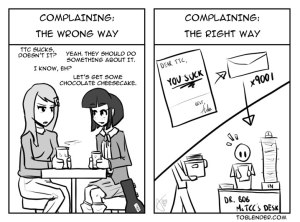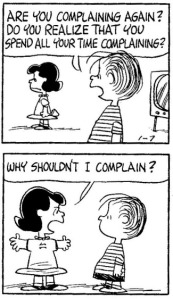
The ability to complain effectively really is an art form. Especially in England, when, culturally, we tend to grumble and pick at the food, without actually saying anything about it, and if we do say anything about it, it’s usually at the wrong time. In England, effective complaining is nuanced, subtle, polite and firm.
Maybe it’s because the English are more passive aggressive, and don’t really want to argue, but customers don’t like to complain face to face, and managers are far too apt to just take an item off the bill, then to actually deal with the issue.
So here are my tips on how to complain, get what you asked for, and maybe get a bit off the bill.
1) Complain at the right time.
So first off. You know that point, when your waiter or waitress comes back and asks how everything is? Yes. This is the point when you complain.
This may seem elementary my dear Watson, but really, as a manager, I’ve settled the bill with tables, took away their empty plates, and asked – did you enjoy your meal? And received a complaint then, and when I asked if they were checked back on, they tell me “Yes, they asked me if everything was ok, and I said it was fine, but it was only average, a bit bland.” See how subtle the language is here. As a manager and a waiter, I always ask – are you enjoying your meal?
If you complain when we check back – there are so many options available – and a good waiter or manager will offer them and let you decide.
If a table of two have a meal not up to scratch, in five minutes I can replace both of their meals so they are still eating together, or just one, or get them a different meal if they don’t want to risk the same dish again, I can, although I hate doing it – reheat the food or cook it for longer. I have then fixed the problem.
Then depending on how quickly I get the meal out, how nice the customers are, and how bad the mistake was, I can decide whether, and how much of a discount or free item I can offer. The free thing is a bonus, and makes the customer leave valued, but they have got what they ordered, and experienced what the restaurant intended.
If you get to the end of a meal before complaining, I can only give you something for free, so you still have a rubbish experience. We don’t fix the problem, we are just buying your silence – hoping you won’t complain through head office, or write a bad review online.
Also, there are a lot of customers who are simply trying to get something for nothing – so your waiter and waitress might doubt whether you actually had an issue – especially if your plate is empty, if you wait till the end of the meal.
If you complain nice and early, you are showing some good will to help us to help you have a real dining experience. Which leads me on quite nicely to the next point methinks.
2) Be a part of the solution.
When dealing with a complaint, I like to give the customer options of how we can fix it. If the complaint is really trivial, or really serious, I can sometimes be a bit stumped.
On, what I like to call, the worst Thursday of my life, it was manic busy, we were not staffed for it, as there was a big carol concert happening at the school next door that we knew nothing about. As the manager who is not trained in the kitchen, I got all the drinks and orders in, and looked into the kitchen to see an hour had passed, and a lot of the young participants had been waiting over an hour for their mains, and had to leave for the carol concert in 15 minutes. The kitchen had no way of getting the food out in time. There was literally nothing I could think to do to make the situation better. The shift was out of control and I could not feed these 15 hungry people. I had to ask – how can I make this better?
When complaining, it is ok to say, ‘You have brought out the wrong item for my partner, and I want you to bring out the correct item and mine to be re-made as soon as possible, so we can eat together. If you say it politely, and in a ‘mistakes happen’ sort of manner, the situation will not be awkward, and the manager knows how to rectify the wrong in a way that is suitable for you.
My job when dealing with complaints is to give the customers a bit more than what they deem appropriate, to make them feel valued, without costing the company an arm and a leg in the long run.
Honestly, I have never known anyone to do more than joke about spitting or jizzing in food from less-than-polite diners. As a manager, I know more than anyone that my team make a lot of mistakes, and they are annoyed at themselves, or each other, not the customer when they are made. If you complain nicely, no one is going to bitch about you, or give you strange looks, and no one is going to tamper with your food.
Which is why you need to…
3) Make us want to help you.
Basically, be nice. We are all human beings, we are all just trying to do the best we can, maybe we have had a bad day, maybe you have, mistakes are just dumb mistakes, we are not being malicious – so don’t be either.
We respond well, and give the best service to those who are friendly and polite. We make less mistakes if we are not under pressure or made to feel nervous about aggressive complaints.
Don’t accept sub-par service or food, but just be nice about it. We are all on the same team, trying to make you leave wanting to come back, being well fed and happy enough to tip well.
4) Leave with the situation dealt with.
Don’t write a follow up complaint instead of complaining to the manager on duty.
But, by all means, if they do not react appropriately, write in a complaint, but if the problem can be fixed on the visit, then it should be.
Whatever it is that gets us servers down, you will rarely hear us moan that we are bored. With every table being so very different, there is always fun to be had.
Take the Friday night just gone. I had a table of rather old, yet springy, couples on table 55. Well spoken and all in a very good mood. They have come out to be well fed and humoured, my favourite kind of table. I was charming, and so were they, they enjoyed their food, and I enjoyed serving them.
Nearing the end of their meal, one of the old men, a writer, I was told, asked me my name. I’ve noticed that slightly older, distinguished men simply must know the name of their server once any sort of rapport is established.
They think it rude not to know and call you by your name once they like you enough.
You spend the rest of the evening feeling like you are about to be told off whenever you hear yourself being asked by name.
Anyway, my actual name is rather unusual yet famous, for various reasons. In this case, as it does for men of a certain age – in fact – of any age, it inspires a rather all-knowing titillated sigh. I’m 22 years old, and it’s weird.
The women then ask me to guess what all the men do for a living. I was essentially being asked by four women to flirt with their husbands. I then have one of the men looking intently into my eyes explaining ‘I’m a gynaecologist, any problems – down there – come to me. I’m the man to speak to’.
The entire situation was made somewhat more – interesting, shall we say, by this man’s hand gesture, which is impossible to describe, as he kept telling me that he was a gynaecologist, and using my name in every sentence. His wife told me he was a farmer, and no one looked at all embarrassed by this exchange, apart from me, apparently.
The imagination of us under-stimulated waiters got the better of us. I spent the next half an hour dragging a certain waitress back from going over and explaining her lady problems to him.
I am now convinced that table 55 were geriatric swingers priming themselves for a good time! An unappetizing picture, perhaps, but a very amusing one nonetheless.
Anyone who has ever worked in a chain restaurant or bar will know the impetus put on the waiters to sell whatever it is we are told to sell that month. At least the perpetual and ceaseless up selling in chain restaurants, is not simply based on what goes out of date that day, as is the case in independent restaurants I have worked in.
Oh no, in chain restaurants, it stems from the hard work and deep thinking of grey, middle-aged men and women. They sit watching their screens, seeing money being made with little or no input from them, scratch their heads, and wonder, what can we pretend to be doing? How can they justify earning thrice that of the team members actually on the floor of their restaurants.
They tend to choose the most revolting concoctions and cheapest dishes to be pushed. Unsurprisingly, pushy, forced sales, along with a gross dish, tends to lead to trouble.
I get it. Don’t get me wrong. Just allow me to put my manager hat back on. Up selling allows new dishes on the menu to get a fair crack of the whip, familiar favourites always seem to win, even if they blow. It makes people aware of what new things an old chain restaurant offers.
More importantly, it gets the front of house team learning new habits, and instinctively asking customers if they want a premium product over a cheaper one. Which leads to a greater average spend per head, which equals greater profits, for the same price as it would otherwise be to open the restaurant doors and put the team on the floor.
Every now and then though, they give you a target you might actually be able to sell. Something you would personally pay real money for. Essentially, something you like. Everyone knows that the best sales people either love their product, or are simply deluded to it. Or maybe just a good liar with a bad conscience.
Anyway, on one such month at a chain I worked in, we were told to push desserts, which sits very comfortably with me, as anyone who has ever seen me with a slice of tiramisu knows well.
So I’m smashing dessert sales, the whole team are, we are taking home bottles of wine as prizes, everyone is happy. But the thing with up selling, is it is always a little bit pushy, and with that, a little bit risky. So handing out dessert menus to one table, who had been a pleasure all night. I co-ordinated their staff party last Christmas, and they were coming in the next month for their next party. I had built up rapport with the table. And then the woman I had spoken to a dozen times on the phone in the last year tells me she does not want the menu.
I say, for the g-zillionth time – ‘Oh go on, you know you want to, our cheesecake is positively stupendous I say!’
Sadly, the response was not the usual cheeky grin and acceptance, but instead a quick, sharp and frankly, frightening reply ‘What?! Are you saying I am fat and would so obviously want a pudding then?!’
That numbing chill falls down my spine, as it becomes clear I have royally pissed her off. Clumsy with my words, and not just my body it may seem.
After muttering ‘Of course not’ whilst quickly wandering off, I am left wondering what I can get from this.
The first conclusion to draw from this exchange is that this, seemingly level-headed woman, was an absolute nut-job – or having a bad day in lady-land.
The other conclusion, is that I am a terrible waitress, with bad judgement, and an offensive persona.
I can also get from this exchange, that I have had hundreds, nay, thousands of conversations with me pushing desserts in a similar fashion, without offending anyone. The thing with the service industry is that you are dealing with people. The thing about people is that they are all different. And not just from one another, but they are different every time they come to the restaurant or bar, or every time you pop over to their table.
Having to up sell and push a particular item, to make yourself look like you are doing your job properly, can lead to selling your guests the wrong thing, and fundamentally, pissing them off. But done right, it really does increase sales, and can lead to me taking a bottle of wine home at the end of the week. Win-win-win methinks.



